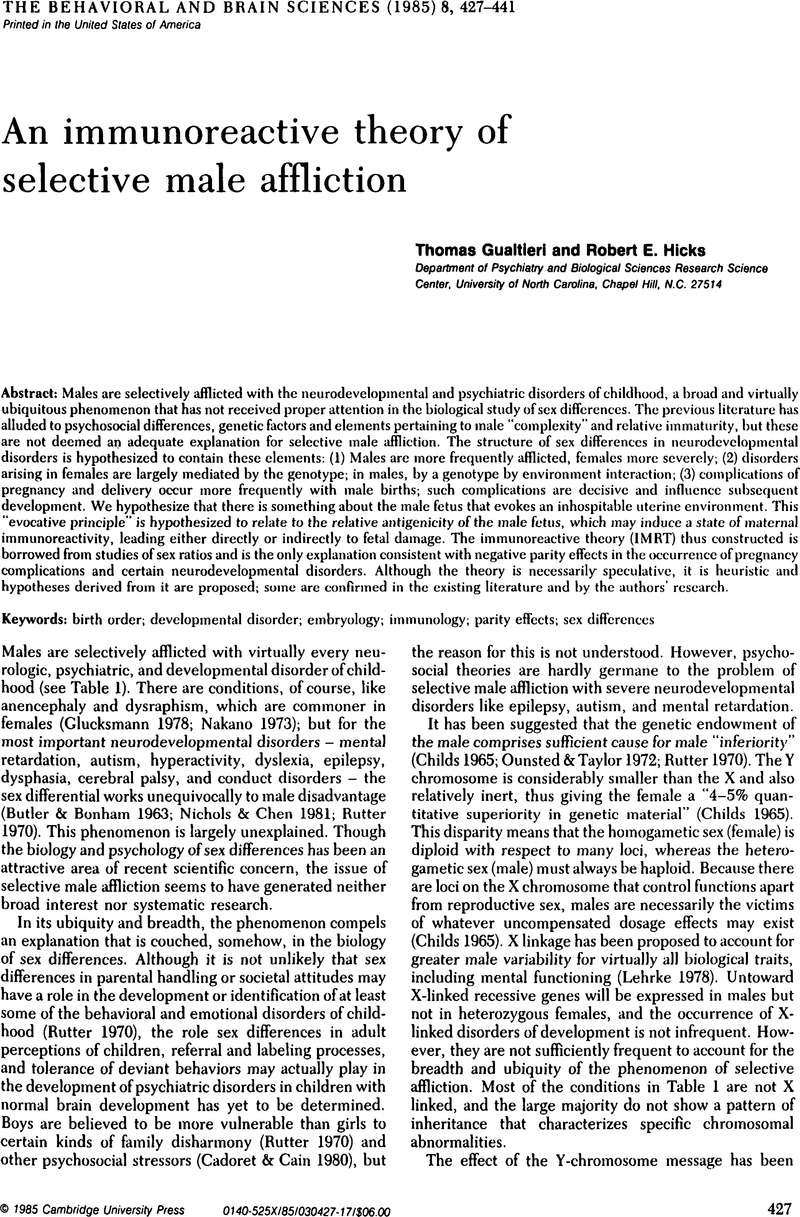Crossref Citations
This article has been cited by the following publications. This list is generated based on data provided by Crossref.
Ellis, Lee
1989.
Evolutionary and neurochemical causes of sex differences in victimizing behavior: toward a unified theory of criminal behavior and social stratification.
Social Science Information,
Vol. 28,
Issue. 3,
p.
605.
Kornbrot, Diana Eugenie
1996.
Resources dimorphism sexual selection and mathematics achievement.
Behavioral and Brain Sciences,
Vol. 19,
Issue. 2,
p.
259.
Newcombe, Nora
and
Baenninger, Mary Ann
1996.
Sexual-selection accounts of human characteristics: Just So Stories or scientific hypotheses?.
Behavioral and Brain Sciences,
Vol. 19,
Issue. 2,
p.
259.
Humphreys, Lloyd G.
1996.
A critic with a different perspective.
Behavioral and Brain Sciences,
Vol. 19,
Issue. 2,
p.
257.
Davis, Hank
1996.
Is there a comparative psychology of implicit mathematical knowledge?.
Behavioral and Brain Sciences,
Vol. 19,
Issue. 2,
p.
250.
Feingold, Alan
1996.
On an evolutionary model of sex differences in mathematics: Do the data support the theory?.
Behavioral and Brain Sciences,
Vol. 19,
Issue. 2,
p.
252.
Zohar, Ada H.
1996.
Genetic influences on sex differences in outstanding mathematical reasoning ability.
Behavioral and Brain Sciences,
Vol. 19,
Issue. 2,
p.
266.
Wynn, Thomas
Tierson, Forrest
and
Palmer, Craig
1996.
Sex differences and evolutionary by-products.
Behavioral and Brain Sciences,
Vol. 19,
Issue. 2,
p.
265.
Rowe, David C.
1996.
The twain shall meet: Uniting the analysis of sex differences and within-sex variation.
Behavioral and Brain Sciences,
Vol. 19,
Issue. 2,
p.
262.
Tan, Üner
1996.
We are far from understanding sex-related differences in spatial-mathematical abilities despite the theory of sexual selection.
Behavioral and Brain Sciences,
Vol. 19,
Issue. 2,
p.
264.
Stanley, Julian C.
and
Stumpf, Heinrich
1996.
Able youths and achievement tests.
Behavioral and Brain Sciences,
Vol. 19,
Issue. 2,
p.
263.
Casey, M. Beth
1996.
Do gender differences in spatial skills mediate gender differences in mathematics among high-ability students?.
Behavioral and Brain Sciences,
Vol. 19,
Issue. 2,
p.
247.
Geary, David C.
1996.
Sexual selection and sex differences in mathematical abilities.
Behavioral and Brain Sciences,
Vol. 19,
Issue. 2,
p.
229.
Hammer, Christy
and
Dusek, R. Valentine
1996.
Brain differences, anthropological stories, and educational implications.
Behavioral and Brain Sciences,
Vol. 19,
Issue. 2,
p.
257.
Crow, T. J.
1996.
All sex differences in cognitive ability may be explained by an X-Y homologous gene determining degrees of cerebral asymmetry.
Behavioral and Brain Sciences,
Vol. 19,
Issue. 2,
p.
249.
Sherman, Julia A.
1996.
Spatial visualization and sex-related differences in mathematical problem solving.
Behavioral and Brain Sciences,
Vol. 19,
Issue. 2,
p.
262.
Kimball, Meredith M.
1996.
Some problematic links between hunting and geometry.
Behavioral and Brain Sciences,
Vol. 19,
Issue. 2,
p.
258.
Gillger, Jeffrey W.
1996.
Sex differences in mathematical abllity: Genes, environment, and evolution.
Behavioral and Brain Sciences,
Vol. 19,
Issue. 2,
p.
255.
Geary, David C.
1996.
On the biology and politics of cognitive sex differences.
Behavioral and Brain Sciences,
Vol. 19,
Issue. 2,
p.
267.
Epstein, Herman T.
1996.
Omissions relevant to gender-linked mathematical abilities.
Behavioral and Brain Sciences,
Vol. 19,
Issue. 2,
p.
251.



